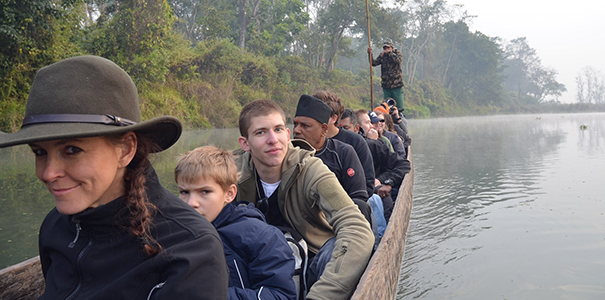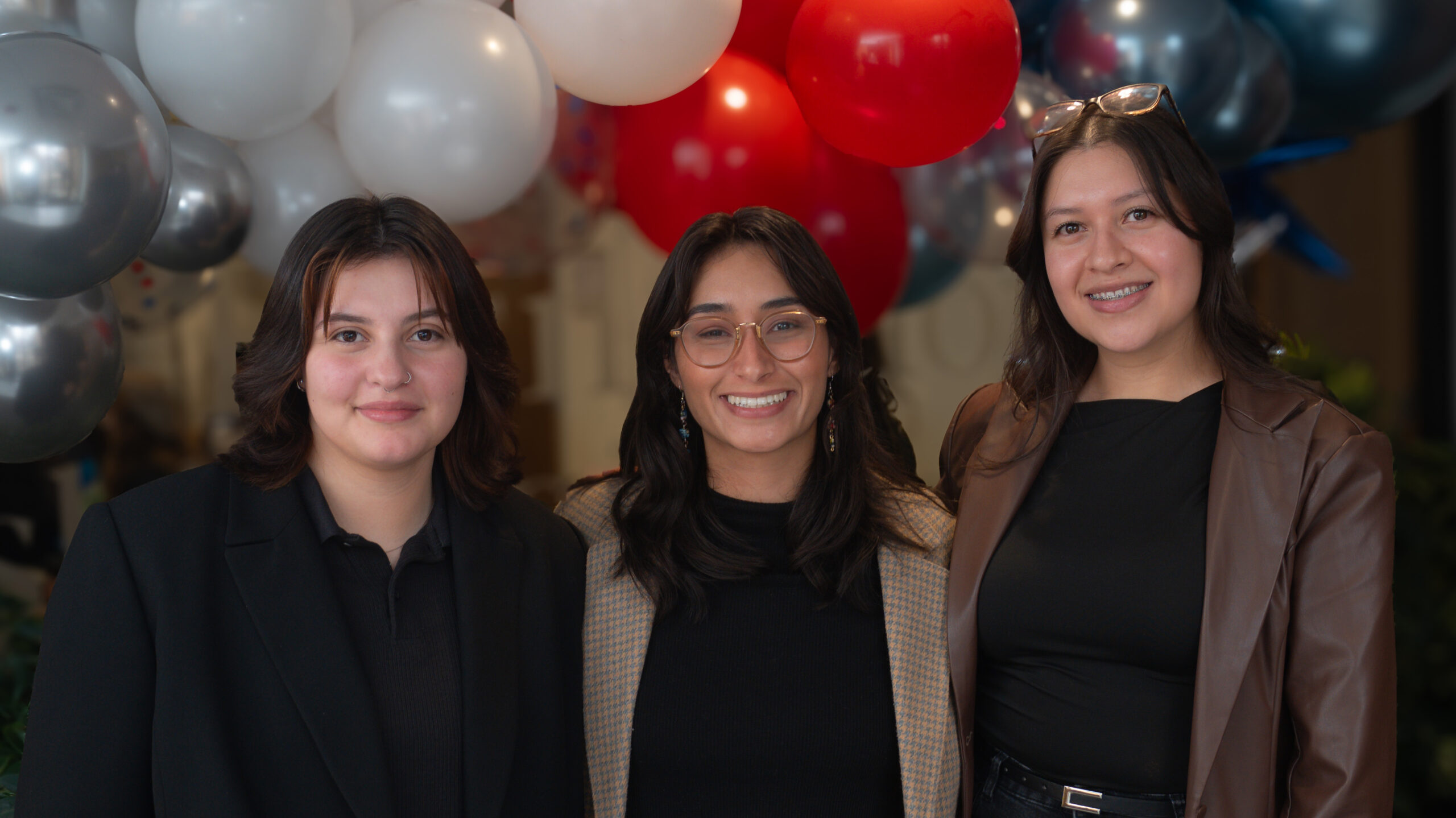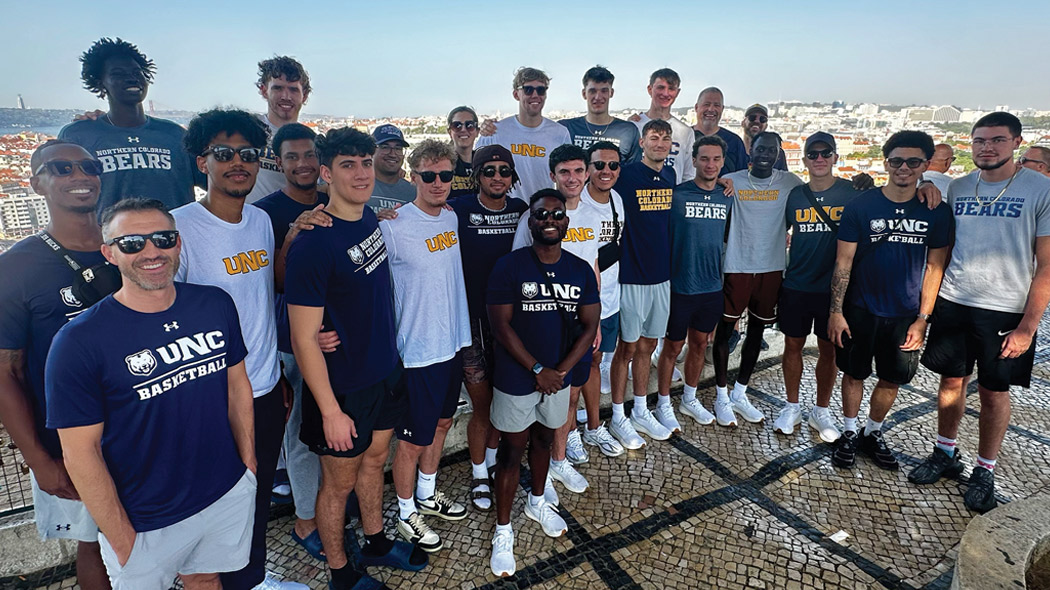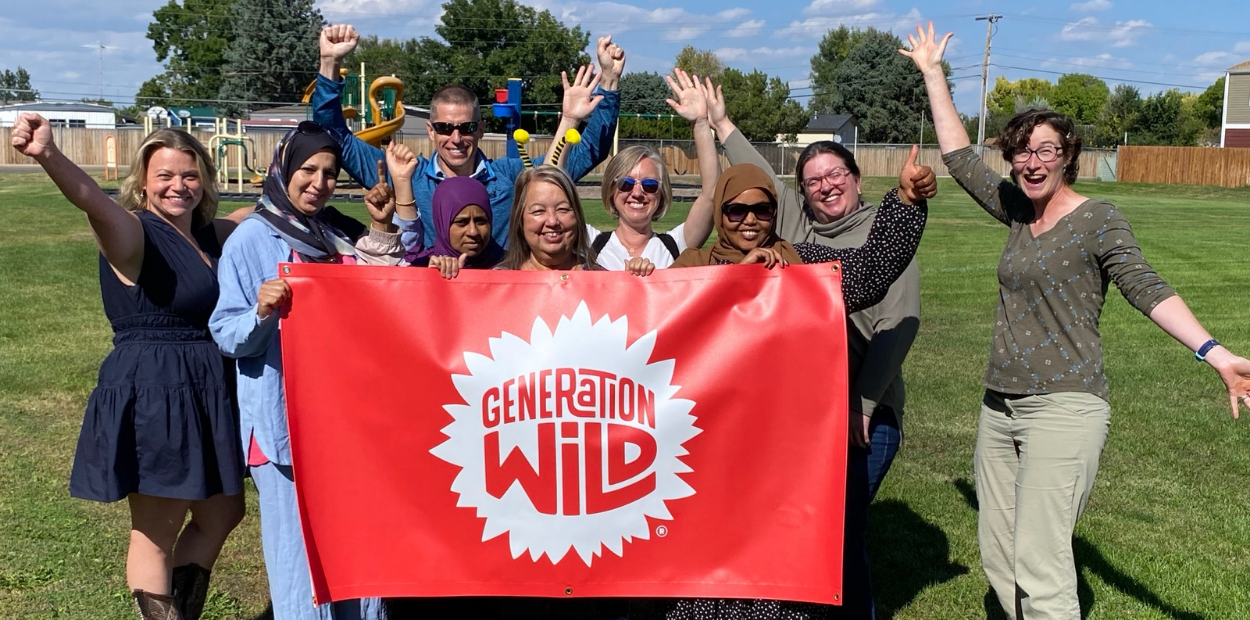
Article
July 27, 2021
Written by Deanna Herbert
UNC Professor Secures Seventh Fulbright Award, Encourages Students to Apply for Similar Intercultural Opportunities
Karen Barton, a professor in UNC's Geography, GIS and Sustainability department, is adding another intercultural experience to her long list as she embarks on a journey to Mexico, taking advantage of her impressive seventh award from the very competitive and prestigious Fulbright Program.
Above: Barton in Chitwan National Park, Nepal, with her son and the student team she brought to help conduct fieldwork as part of her 2019 Fulbright Specialist Award with the Institute for Crisis Management in Kathmandu.
Since winning her first Fulbright award in 2007, Karen Barton, a professor in the Geography, GIS and Sustainability department at UNC, has been traveling to different parts of the world, researching topics such as the preservation of wetlands in South America, natural hazards in Asia and religion and diversity in West Africa. This summer, she’ll add another intercultural experience to her long list as she embarks on a new journey to Mexico, taking advantage of her impressive seventh award from the very competitive and prestigious Fulbright Program.
As part of her most recent Fulbright-Hays fellowship, funded by the U.S. Department of Education, Barton will travel to Mexico City next month to study Afro-Mexican history and geography. While she’s there, she’ll explore the cultural geographic connections between Africa and Mexico and complete a research and teaching project she can bring back to her classrooms. This project is a natural extension of the research she’s been conducting over the past five years in West Africa, and an opportunity to expand that research to further explore the connections between West Africa and this part of the world.
“For a long time, the percentage of African settlers inside of Mexico has been underrecognized so we’re trying to show those roots in Africa through this program,” Barton said. “I think this is a pretty timely program, particularly given everything that’s going on in this country in recognizing African heritage.”
Barton will spend her time studying the culture, music and history in Veracruz and Oaxaca, two cities where there is a significant Afro-Mexican population. She’ll use that research to create story maps depicting Afro-Mexican heritage that she can incorporate into her own curriculum and share with other classes and teachers as well. Story maps integrate photographs, video and audio with other information to help bring a particular issue to life in a more graphic way than traditional texts. It’s a learning strategy she’s familiar with, having used it in the past to detail the account of Africa’s greatest shipwreck, The Joola, a story she learned about during her 2016 Fulbright-Hays fellowship in Senegal.
“The point for me is that I want this research to be more easily disseminated so that a lot of populations can have access to the material, not just a small community of scholars,” Barton said.
Beyond the research and curriculum development, Barton is also hoping the collaboration with her Mexican colleagues will serve as a catalyst to create direct linkages between UNC and post-secondary institutions in Mexico. And eventually, when pandemic conditions allow, she’s hoping there will be an opportunity for a two-week study abroad course in Mexico with some of these same colleagues, looking at the issues they are studying now in relation to Afro-Mexican heritage.
While Barton is certainly excited about her new project, as well as the opportunity to collaborate with colleagues from abroad, she’s equally passionate about promoting what the Fulbright experience can offer – particularly for students through the Fulbright U.S. Student Program. As a first-generation scholar, her own Fulbright experiences have been very important to her and she’s aware that the competitive nature of the program can be a deterrent for some in their decision to apply.
“I am constantly telling my students that they need to apply for these kinds of things,” Barton said. “Oftentimes students underestimate their capabilities in terms of getting these larger awards. But when you look at the array of people who are awarded Fulbright, it’s not always people from Ivy League institutions. Our students are very deserving of the same opportunities that students have at other institutions and they should take advantage of the good mentoring they get at UNC from faculty and staff.”
Some of that “good mentoring” comes directly from Barton, who has been teaching at UNC for the past 17 years. One example is her Geography 466/566 course that is primarily geared toward writing research proposals. Her class is open to all UNC students and covers the details of writing budgets and research statements, and of course offers students the option of writing a Fulbright proposal.
Barton has also been known to involve students in her work, providing further opportunities for a more direct impact on their cultural learning. In 2019, she expanded the scope of her Fulbright Specialist Award with the Institute for Crisis Management in Kathmandu, Nepal, inviting UNC students to help with the fieldwork. An interdisciplinary group of 10 graduate and undergraduate students accompanied her to Nepal, assisting with natural hazards mapping and conducting interviews with area residents for a community resiliency project after the 2015 Gorkha earthquake, which killed over 9,000 people.
“I think this experience was very enlightening for them to not just read about the stories in the classroom or learn about them through an assignment, but to see these issues firsthand,” Barton said.
She has also organized and led undergraduate field expedition courses to Iceland, Peru, Nicaragua and Guyana.
Beyond her support in the classroom and in the field, Barton is also the vice president for Fulbright Colorado, an advocacy organization that supports other Fulbright scholars, including promoting the program to students by engaging speakers, providing webinars and hosting events. Given her experience and familiarity with the Fulbright Program, she’s begun to organize her thoughts around a long-term project about it.
“It kind of feels as if the direction I’m being pointed in is to do a book project about Senator Fulbright,” Barton said. “He made some controversial voting decisions when he was a senator. I’m interested in exploring a project that highlights all the wonderful things that have come out of Fulbright in terms of intercultural communication and ambassadorship, but at the same time understanding that we all have complicated legacies that we leave behind. It will also include stories from my colleagues who have traveled on Fulbrights and how it has altered their lives as first-generation scholars, or otherwise.”
Barton can’t speak highly enough of the Fulbright program and her hope that more students take advantage of it. While she doesn’t want to send the message that students have to go beyond U.S. borders to have intercultural experiences, she does think those experiences offer a chance for people to see and experience a side of other cultures that may not be taught in the classroom.
“I think Fulbright has really taught me to listen well and to give people the benefit of the doubt; a chance to share their narratives. I’m always surprised, wherever I go.” Barton said. “I would love for more students to apply and to realize they stand a chance at getting these awards.”
Barton’s advice and encouragement for students is timely. Fulbright U.S. Student Program’s national deadline for the 2022-23 award cycle is Oct. 12, 2021. Graduate students and undergraduate seniors can apply. Interested students are advised to contact UNC Fulbright Program Advisers Olga Baron, executive director of UNC’s Office of Global Engagement, and Barton for more information about the deadline materials, application process, and internal deadlines for application review prior to submission.
About the Fulbright U.S. Student Program
The Fulbright U.S. Student Program provides grants for individually designed study/research projects or for English Teaching Assistant Programs in a participating country outside the U.S. During their grants, Fulbrighters will meet, work, live with and learn from the people of the host country, sharing daily experiences. The program facilitates cultural exchange through direct interaction on an individual basis in the classroom, field, home, and in routine tasks, allowing the grantee to gain an appreciation of others’ viewpoints and beliefs, the way they do things, and the way they think.



